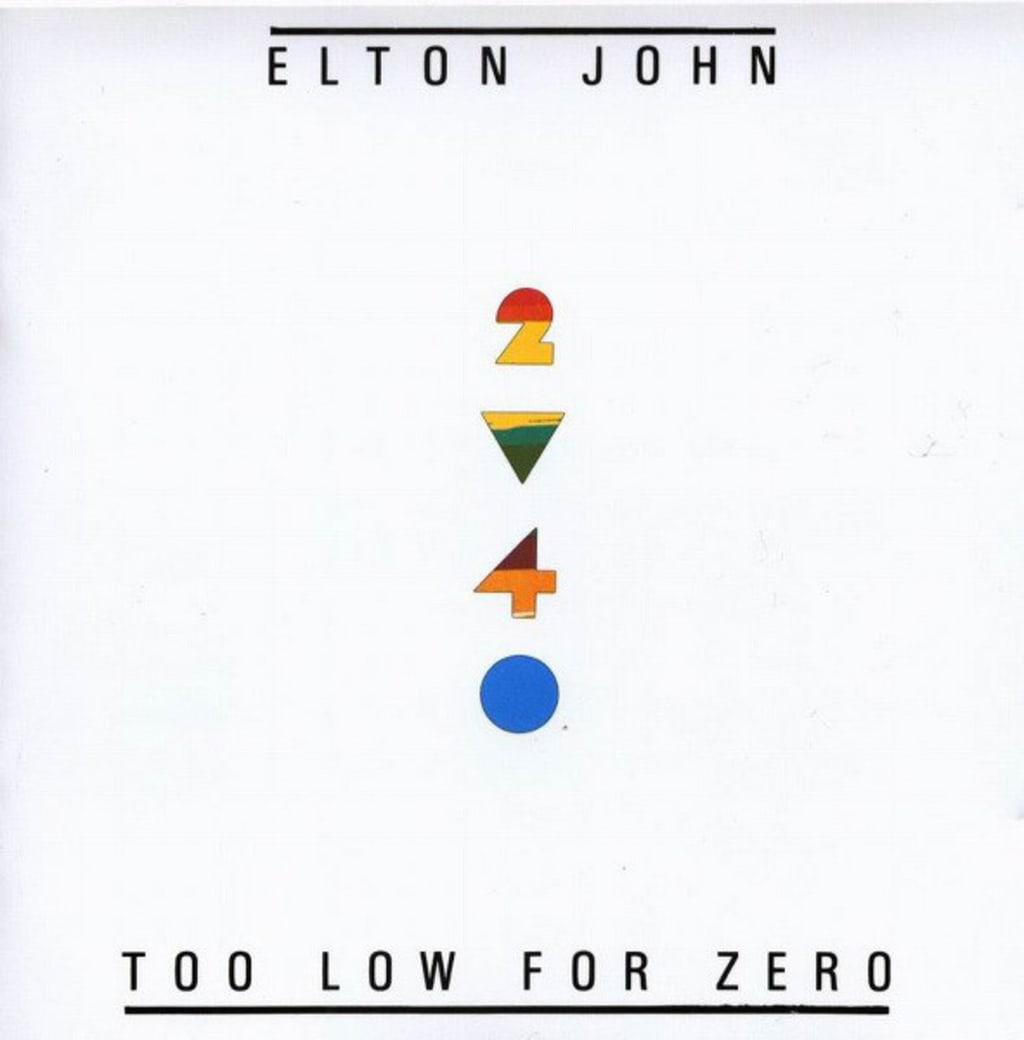'Too Low for Zero'
Elton John's "Back to Basics" album

After years of relatively lackluster albums, Elton John decided to go back to basics with 1983's Too Low for Zero. Chris Thomas, who had produced Elton's last few albums, would return, however, for the first time since Blue Moves, Bernie Taupin would write all lyrics for the album, and all instrumental tracks would feature the classic core band of Davey Johnstone on guitar and vocals, Dee Murray on bass and vocals, and Nigel Olsson on drums and vocals. As was the case with many of Elton's albums, things came together quickly. Bernie's lyrics were set to music and the entire album was recorded within two weeks at AIR Studios in Monserrat and Sunset Sound Recorders in Los Angeles.
The album opens with the track "Cold as Christmas (In the Middle of the Year)," a tale of a Caribbean vacation meant to rekindle a marriage and failing very badly. Elton provides a serviceable but not particularly inspired ballad feel, featuring such Elton John regulars as Kiki Dee on background vocals, Skaila Kanga on harp and Ray Cooper on percussion. Not a bad album track, but not the high-impact opener one might have wanted in light of Elton's recent mediocrity.
A better album opener might have been "I'm Still Standing," a song that would become an Elton anthem and that remains a highlight of his concert repertoire to this day. "Standing" was one of two hit singles from the album, and while decidedly 80s in its production, its message of perseverance and facing adversity have resonated with audiences since. In fact, in the Elton "fantasy/biopic" Rocketman, the song was used at the story climax to herald Elton's conquering of his substance problems. Like much of the movie, the timeline on use of the song is a bit off. Elton's rehab and sobriety did not take hold until 1991, a full eight years after the Too Low album.
The next track, the title track of the album, probably present a better picture of Elton's actual state of mind at the time. Bernie's protagonist here is someone too tired to get up for work after tying one on and losing his shirt the night before. "Too Low for Zero" is a decent track and features nice background vocals but fails to propel the album in any meaningful way.
Up next is the upbeat "Religion," a second consecutive "woe is me" tale, this time bringing in a few words about religious hypocrisy. It's no better than an average rocker, though it does feature some tasteful guitar work from Davey Johnstone.
On the very next track, to my mind by far the best track on the album, Davey Johnstone receives a somewhat rare co-writing credit. It's the album's second single, "I Guess That's Why They Call It The Blues." If you want a writing credit on any of these tracks, this would be the one.
While Bernie Taupin has disparaged some of the lyrics as cliched (notably "I simply love you more than I love life itself") any such doubts are dispelled by the most assured musical track the Elton John band had cut in years. Amazingly, the song-stealing, highly memorable harmonica solo from Motown legend Stevie Wonder almost didn't make the cut, as Elton did not think a harmonica solo would work with the song. To say that Wonder's attempt convinced him otherwise would be an understatement, and thankfully that's the version that has dominated radio ever since. The song has also been a staple of Elton's live shows and remains on the playlists to this day.
Following this shot of energy (as most people listened on vinyl in 1983 they would have had to flip the record here), "Crystal" is a bit of a letdown. The song sounds like a relic from the 80s, with its pronounced synthesizers and programmed drum beat. (Speaking of synthesizers, it is notable that Elton played all the synthesizers on the album, taking over from James Newton Howard who had played synthesizers on Elton's previous work. Elton said that with synthesizers, he could more easily write upbeat songs, which he felt never sounded right on conventional pianos.) Again, the album is stopped in its tracks a bit by this tale of a woman changing the relationship of a couple of "bros."
Next is the relatively heavy rocker "Kiss the Bride," a tale about loving another man's wife, which features great backing vocals from Davey, Dee, and Nigel and more great guitar work from Davey Johnstone. It doesn't hit as hard every time you hear it, but it is certainly one of the better-regarded album tracks from Elton's "post-classic" period.
The next track provides the album's first convincing one-two punch and certainly fills out the hardest rocking pair of songs Elton had issued in sequence in quite a while. On "Whipping Boy," Davey continues his great guitar work supporting a dark tale of defiance bolstered by backing vocals from Davey, Dee and Nigel.
Next is "Saint," a fairly cliched lyric met instrumentally at least at the start of the song by an attack that is pretty much all synthesizer. The rhythm section comes in later to add a little more color to the song. Essentially, it's an okay song, but the 80s synthesizers date it a little and end a streak of impressive work from Davey.
The aforementioned former Elton keyboard player James Newton Howard makes an appearance on the album's closer (dispensing with any CD bonuses added later, which were all abandoned pieces from at least 4 years earlier), writing the string arrangements for "One More Arrow." Ostensibly about Bernie Taupin's relationship with his father, this joins the long list of Elton's fine piano-driven ballads, one of his best in quite a while. With Dee Murray's bass adding additional instrumental color, Nigel's drums providing an effective contrast toward the end, and Davey, Dee and Nigel's harmonies throughout helping to end the album on a high note.
Too Low for Zero was probably Elton's best album since his 70s heyday, coming closest to restoring the missing magic from Elton's records in the 80s. But the distance between the album's high points and low points is perhaps the most dramatic in his entire catalogue. This is an album that helps explain why mix tapes became so popular in the days before iPods and other devices made the song the star, rather than the album.
About the Creator
Sean Callaghan
Neurodivergent, Writer, Drummer, Singer, Percussionist, Star Wars and Disney Devotee.






Comments
There are no comments for this story
Be the first to respond and start the conversation.